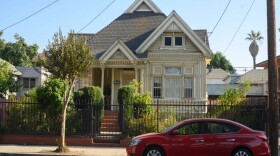Jewish settlers broke ground on construction projects Wednesday in the West Bank, defying a ban imposed by Israel that is due to expire this month. Settler groups -- which said the move was in response to the killings of four settlers Tuesday -- along with their government supporters have been pushing to end the freeze. But Palestinians say they'll walk out of peace talks if that happens.
Yitzach and Talia Imas and two other Israelis were killed Tuesday night when their car was sprayed with bullets near the settlement of Kiriyat Arba outside Hebron. The armed wing of the militant group Hamas claimed responsibility for the attack.
At a ceremony for the couple, who were buried at the Jewish cemetery atop the Mount of Olives overlooking Jerusalem, one of their children sobbed, remembering her mother and father as devoted partners and parents. But personal pain was quickly transformed into political rhetoric by the other speakers -- among them, a member of Netanyahu's Likud party.
MP Ayoob Kara said the killings only show that Israeli Prime Minister Benjamin Netanyahu's policy of what he calls appeasing the Palestinians isn't working.
"How many sacrifices can we make until everyone understands the truth?" Kara asks. "We don't need to give back territory because of a Nobel Prize or a photo op on the White House lawn. Is this the policy we should be pushing?"
The main settler organization quickly capitalized on the outrage the killings provoked by unilaterally announcing an end to the so-called settlement freeze that's been in effect for almost 10 months. In the settlement of Adam near Ramallah, diggers and other heavy equipment leveled ground for a new sports center while children waved Israeli flags.
"What's going on in Washington is a farce," says Naftali Bennet, the director-general of the Yesha Council, one of the main settler organizations. The Obama administration and Mideast leaders -- including Netanyahu and Palestinian President Mahmoud Abbas -- are meeting this week in Washington, D.C., to try to negotiate a peace deal.
"This is not peace. It's talking with terrorists that are determined to erase us from the earth," Bennet adds. "We are determined to stop that, and there's only one way to do that, and that's to build. There is only one language they understand, and that is strength and growth, and that is what we are going to do. We are going to grow strong."
Up until now, Netanyahu has managed a balancing act -- keeping together his largely right-wing coalition, many of whom support settlements, while moving forward with the peace talks. They don't want to see him back down on the issue of settlements.
Palestinian leaders say they will walk out of the talks unless the settlement freeze is extended after Sept. 26. They may have no choice. There is immense pressure on them from the Palestinian public, which has little appetite for the peace talks.
Even members of President Abbas' Fatah party are skeptical that the negotiations can succeed. And on the ground in the villages and towns of the West Bank, many of which are encircled by settlements, Palestinians say they want Abbas, who is also called Abu Mazen, to stand firm on the issue of Jewish building in the West bank.
"I support Abu Mazen totally," says Mohammed Jamil Ibrahim, the mayor of the village of Turmus Ayya. "I am a Fatah supporter. I support negotiations because without negotiations we are going to get nothing. However, in my view these negotiations will not succeed. As long as Israel plans to continue building on confiscated land, there is no way that there will be success in these negotiations."
Analysts say how Israelis and Palestinians will resolve this issue is not yet clear.
"Probably a fudge," says Reuven Hazan, a professor of political science at Hebrew University. "It is unlikely that we will remain with a complete freeze because politically that is difficult for Netanyahu."
On the other hand, Hazan says, "The ending of the settlement freeze three weeks after the beginning of negotiations, if it is ended massively, then this will be a public relations fiasco for Israel. So, somewhere in the middle -- a little bit of building, not in contentious places -- more or less keeps everybody a little unhappy."
Copyright 2022 NPR. To see more, visit https://www.npr.org. 9(MDAzMjM2NDYzMDEyMzc1Njk5NjAxNzY3OQ001))






